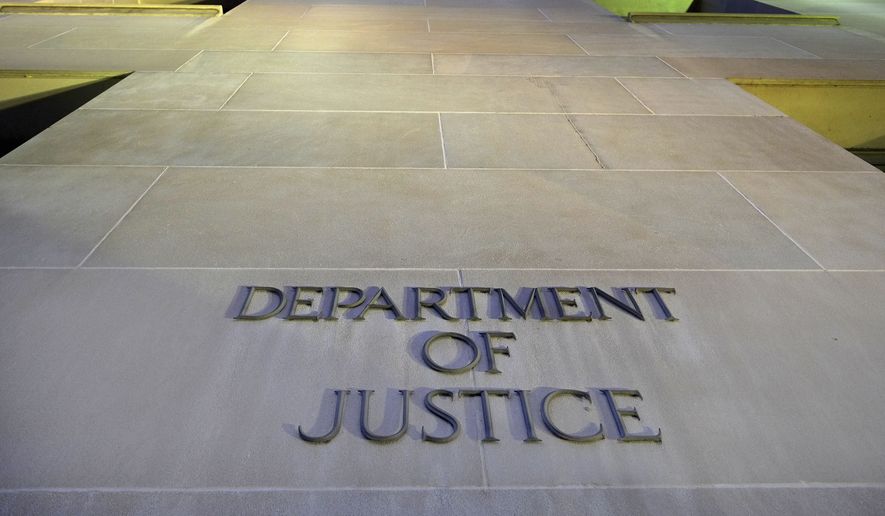A coalition of international law enforcement agencies dismantled the world’s largest child pornography marketplace, the Justice Department announced Wednesday.
The bust rescued 23 children and netted 337 alleged child pornography users around the globe, including 53 in the United States, said Jessie K. Liu, U.S. attorney for the District of Columbia.
Authorities called it a watershed moment in the fight against child pornography.
“The scale of this crime is eye-popping and sickening,” said John D. Fort, chief of IRS criminal investigations.
Law enforcement in the U.S., South Korea and Great Britain partnered to shutter the child-porn website Welcome to Video in March 2018. They kept their actions secret so they could expose and prosecute some of the site’s anonymous users.
The site contained nearly 250,000 videos, or almost 8 terabytes of images, showing sex acts involving children, toddlers and infants. Some of the children were as young as 6 months old, authorities said.
The site was so committed to child pornography, its landing page stated in red bold print: “Do not upload adult porn.”
Law enforcement officials had not been aware of almost half of the videos seized, and many of the children in the videos have not been identified, said Deputy Assistant Attorney General Richard Downing.
The Rape, Abuse & Incest National Network, the nation’s largest anti-sexual violence organization, implored the Justice Department and Department of Homeland Security to identify the children.
“Alarmingly, the majority of children abused in the 250,000 images seized are unknown to law enforcement. We urge DOJ and DHS to aggressively pursue the identification and rescue of these children,” said Camille Cooper, vice president of Public Policy for the group.
Jeff Dion, chief executive officer of the Zero Abuse Project, an organization committed to fighting child sexual abuse, called the bust a “huge victory.”
“It not only identifies the perpetrators, but it also helps to undermine the market for child pornography,” he told The Washington Times. “That’s key because this site, like so many others, requires people to upload new child sex abuse videos to access images. That means for most people they have to sexually abuse a child and film it to have the currency to use the site. That is a huge part of the problem.”
Around the same time law enforcement broke up Welcome to Video, authorities in the U.S. and South Korea brought charges against its operator, Jong Woo Son.
Son is serving an 18-month prison sentence in South Korea on charges related to child pornography.
On Wednesday, U.S. authorities unsealed an indictment against Son. He faces nine counts, including conspiracy, producing, advertising and distributing child pornography and money laundering.
Ms. Liu declined to say if Son would be extradited to the United States.
Welcome to Video operated from June 2015 to March 2018 and had become so popular among pedophiles it processed 7,300 bitcoin transactions worth more than $730,000 in that time.
The website existed solely on the dark web, a seedy section of the Internet that can be accessed only through a Tor browser that masks users’ digital footprints.
Users could buy videos using bitcoin or other cryptocurrency. A VIP membership cost roughly $300.
Members also could join the site for free and then earn points by uploading videos and referring new users, according to court documents.
U.S. prosecutors filed a related civil forfeiture case seeking to seize bitcoin assets held in 24 accounts.
A key break in the investigation came in September 2017, when law enforcement officials noticed the site’s administrator mistakenly exposed its IP address. Authorities were able to trace the address to South Korea and its owner, Son, according to court documents.
Investigators conducted undercover controlled buys of child pornography from the site, working closely with U.S. and South Korean law enforcement.
A U.S. magistrate signed a sealed warrant for Son’s arrest in February 2018 and, a month later, South Korean authorities seized Welcome to Video’s server and storage media.
Computer files seized in the raid detailed customer data connecting users to payments.
The Justice Department detailed some of the U.S. individuals charged in the investigation. Users in 23 states and the District of Columbia have been arrested and charged.
Nicholas Stengel, of the District, was sentenced in October 2018 to 15 years in prison after pleading guilty to money laundering and receiving child pornography. He admitted to paying $377 in bitcoin to download 2,686 child-porn videos totaling more than 455,000 hours over six months in 2017.
Michael Lawson, who was in the Army and stationed at Fort Benning, Georgia, was convicted of filming his children’s friends — two girls aged 10 and 15 — taking showers and using the bathroom. He was sentenced to 121 months in prison last year.
Mr. Dion said it’s not surprising that most of the U.S. individuals are young, white-collar professionals.
“They are not the people we usually think of when we think of someone who is viewing child pornography,” he said. “It increases awareness in all parts of society that no one is immune. It can happen anywhere.”
Federal prosecutions have risen more than 60 percent over the past decade. The National Center for Missing and Exploited Children says online reports of abuse or exploitation jumped from 1 million in 2013 to 10 million in 2017. The number topped 14 million in 2018.
Those numbers likely understate the problem because authorities say many child abuse incidents go unreported.
• Jeff Mordock can be reached at jmordock@washingtontimes.com.




Please read our comment policy before commenting.